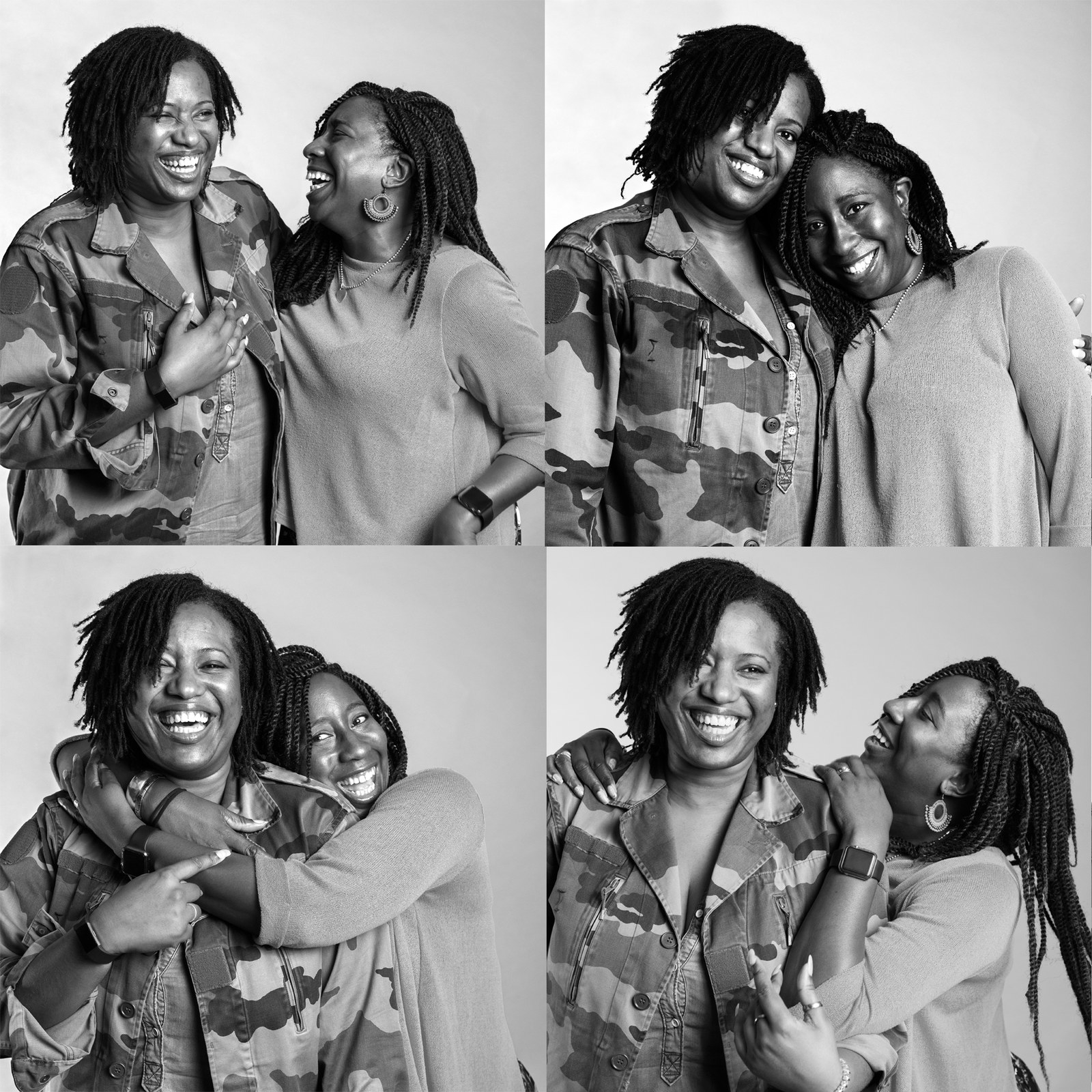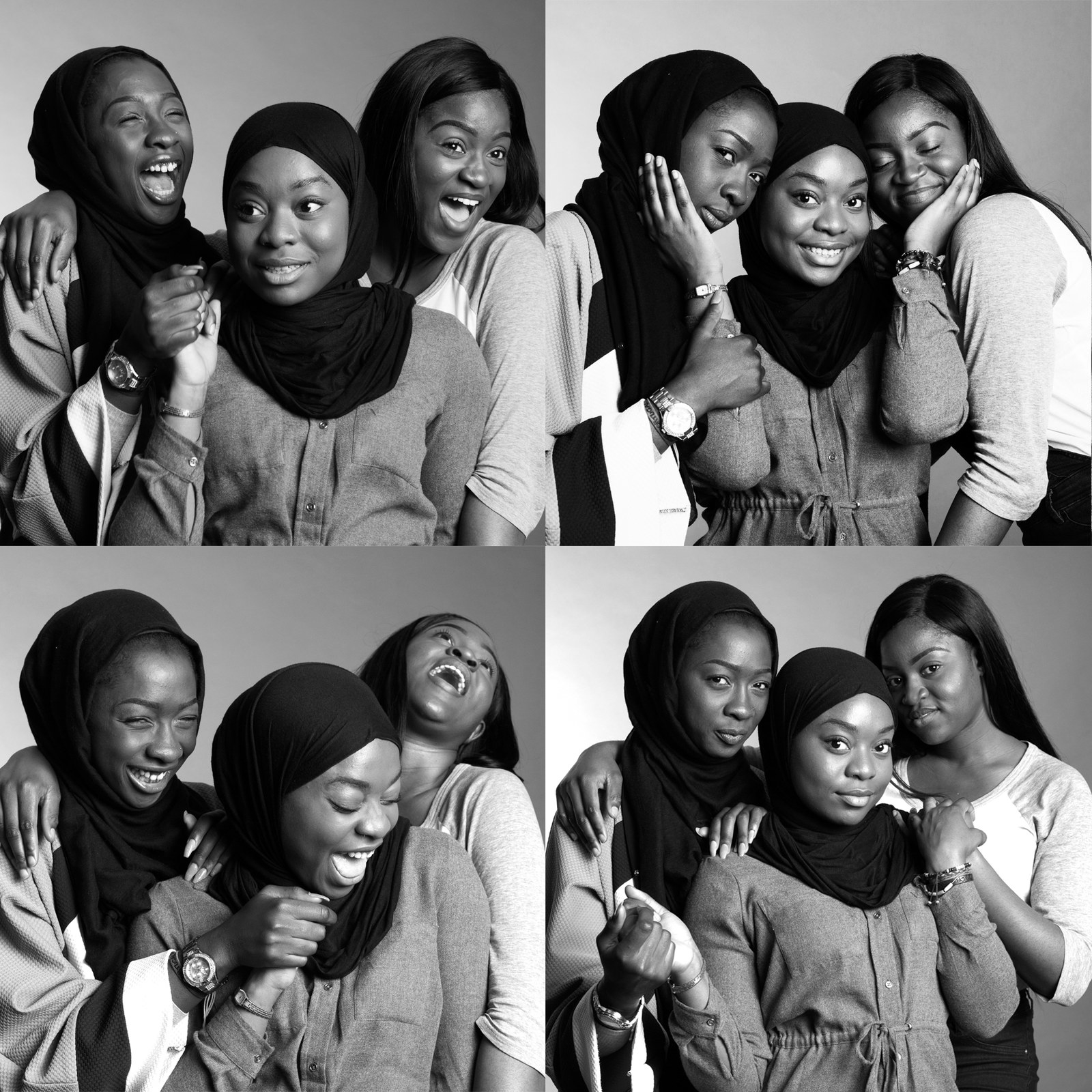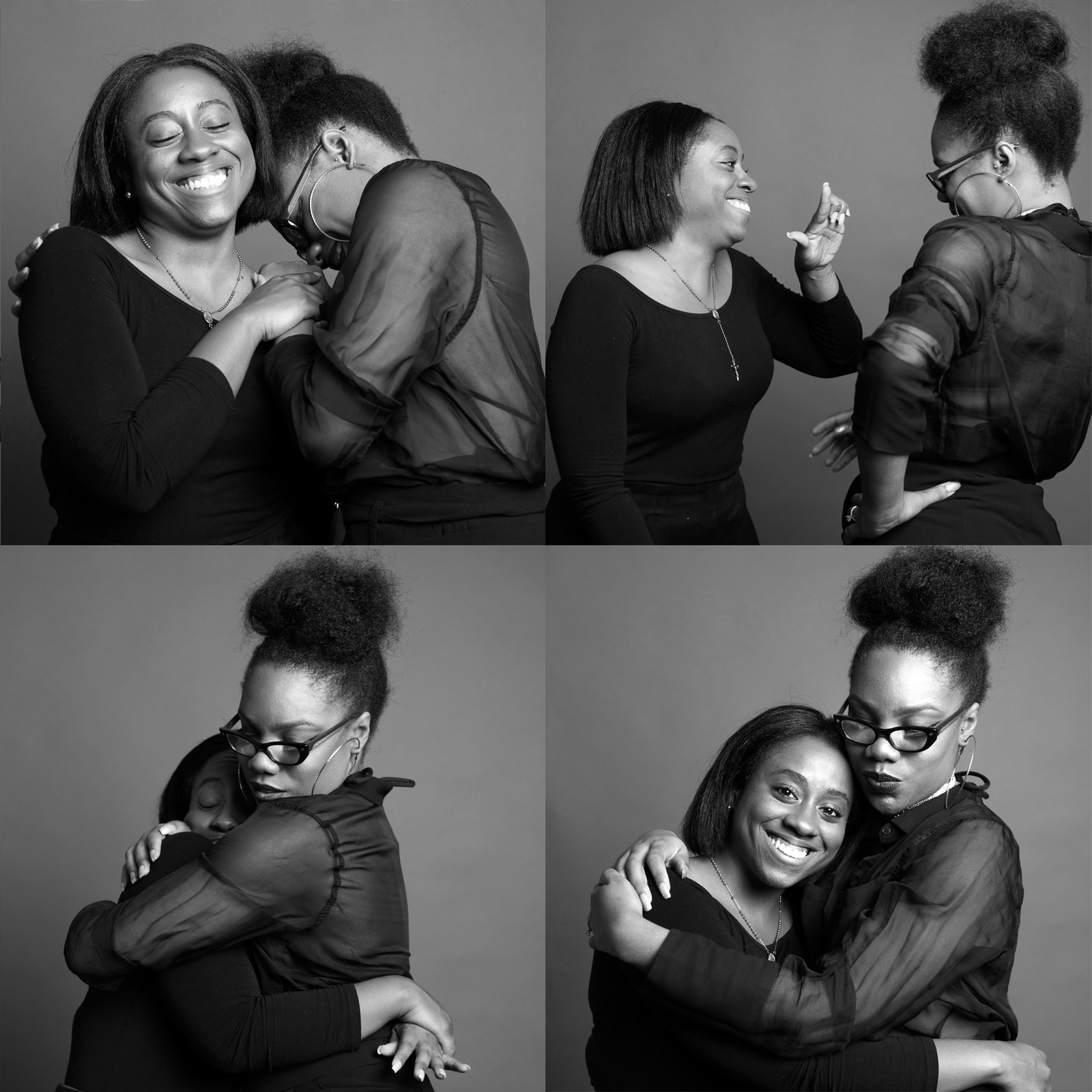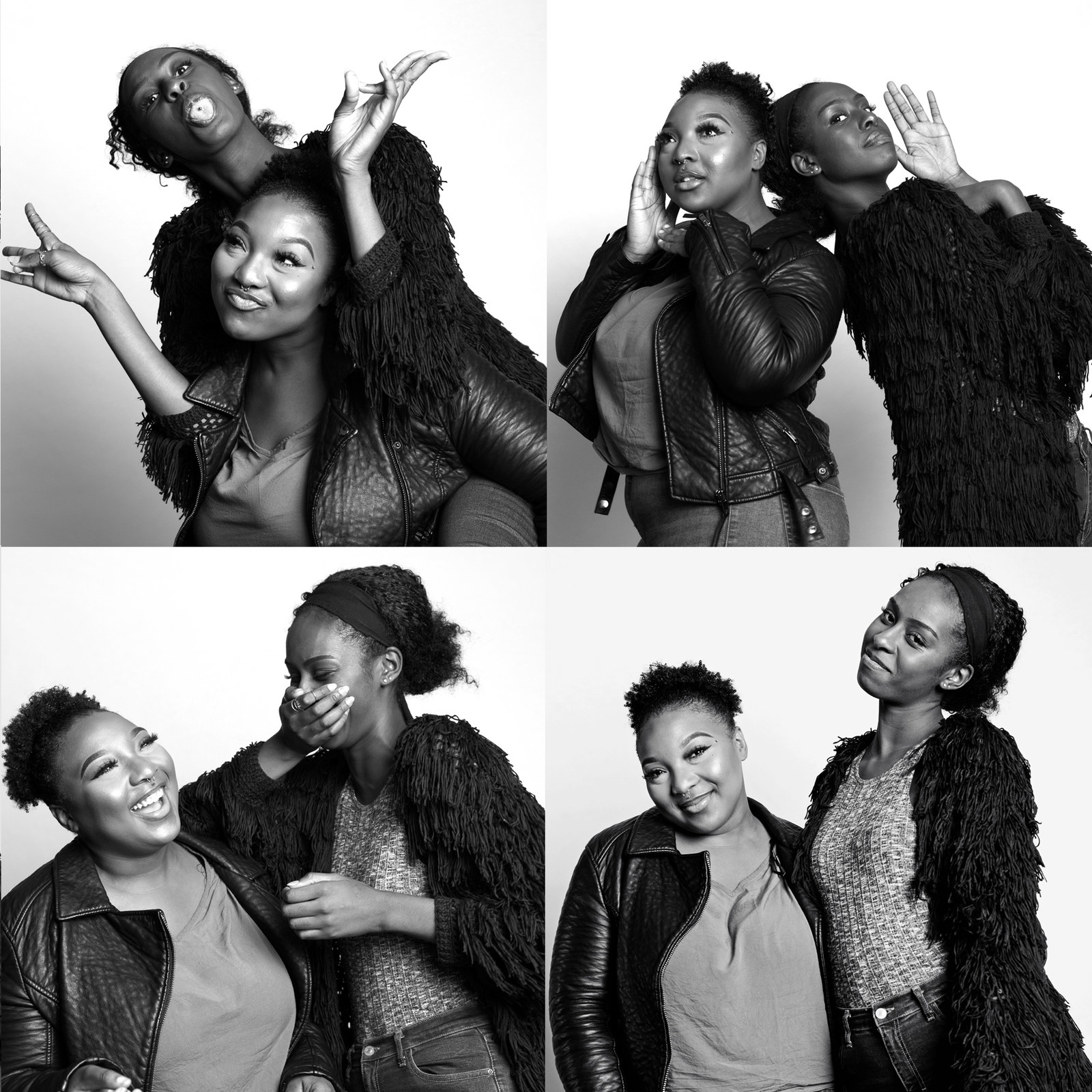A major part of the appeal of Issa Rae’s history-making TV show Insecure is how lovingly she's captured the beauty of black sisterhood – relationships that, for many, are an essential part of their lives.
The bond between the characters of Issa and Molly has resonated with the show’s primary audience, who see their own friendships reflected in an authentic way: friendships they rely on as they make their way through a world of microaggressions and blatant discrimination, and the love and laughter that lights that path.
It’s no surprise that films like Girls Trip that explore similar themes have cashed in at the box office this year. While these stories might be relatively new to the big and small screen, they are just another fact of life for black women.
With this in mind, BuzzFeed News spoke to four different groups of friends to find out what their besties mean to them.

Tash Anderson, 43, from London, and Cheinah Sutherland, 42, from Essex

When Tash and Cheinah were introduced by Cheinah’s younger brother 21 years ago, there was an immediate connection. “When we met we just instantly bonded,” Tash says, adding that maintaining a strong friendship requires effort on both sides.
“Friendships are something which you have to nurture,” she says. “With some people it’s easier to do with than others. Some friends I haven’t spoke to in ages but when do I speak to them it only feels like I spoke to them yesterday. That for me is what proper friendship is, and that’s what I have with Cheinah. I know if I were to call on Cheinah she would be there, without a doubt.”
And it’s totally reciprocal, Cheinah says. She recalls a time when Tash was there for her when she went through a difficult divorce: “I was with my husband when I was 17 years old and we had been together for a while – during our relationship I was on the verge of a breakdown.
“The amount of times Tash has come and sat with me and been on the phone with me, it’s exactly what you need when you’re going through a bad time in your life.”
"She's not a friend. She is family."
Among the many things Tash admires about her best friend is her resilience. “Oh god, there’s so many things I love about Cheinah,” she says. “I love the fact no matter what life throws at her, she always picks herself up and carry on. I love how she has raised her children to be amazing men and women.”
But the best thing about friendship is that a good friend and good times go hand-in-hand. Asked about their favourite shared memory, they both laugh. “We don’t need Girls Trip,” Tash says. “Every time we go out it is Girls Trip for us. We love [the Notting Hill] carnival. We go every year together. Cheinah loves to wine! What happens in carnival stays in carnival.”
“Until someone uploads it to Facebook!” Cheinah adds.
The two have made a promise to attend carnival every year until they get old. “We will be there in our carnival outfits, kneecaps, and Zimmer frames,” says Cheinah.
“I am not surprised we have been friends this long. Our friendship is just natural; she’s not a friend. She is family.”

Naffisa Cham, 20, Khadeejah Badru, 19, and Aishat Atinsola, 20, all from London

When Khadeejah brought Aishat and Naffisa, her two best friends, into the BuzzFeed office, it was actually the first time Aishat and Naffisa had ever met, but from the chemistry between the three of them it was impossible to tell.
Khadeejah met both Aishat and Naffisa through Twitter around three years ago. Aishat says: “There was a book you were posting on Twitter – I think it was Americanah by Chimamanda Ngozi Adichie – and then I followed you.”
Friendship isn’t just about the length of time some people have been friends, Aishat says, but the depth of the connection: “You can know someone for 10 years and they can really mess you over, and meet someone in six months and they can do the most for you. Friendship doesn’t test time.” Naffisa chips in: “It’s all about quality, not quantity.”
Khadeejah and Naffisa agree their favourite shared memory was when they led a march in support of the those affected by the tragic Grenfell Tower fire earlier this year. “I had goosebumps all over,” Naffisa says. “We had the whole community behind us, everyone was hurting the same.”
Khadeejah says she was moved by how passionate Naffisa was. “That was love, that was rare, that was the most heartwarming thing ever,” she says.
"I felt comfortable to be vulnerable."
The warm words perfectly capture Khadeejah’s character. Naffisa says: “The thing I love most about Khadeejah is how supportive she is. She’s always been that shoulder to cry on. She’s so, so funny and intelligent. Whenever I need advice, I’d go to my sister, or Mum, or Khadeejah.”
Aishat adds: “I don’t really tell people what I am feeling, but my first year of university was really hard. Me and Khadeejah and another friend had a three-way phone call. I felt so comfortable to cry to my friends and I felt comfortable to be vulnerable in front of my friends. They were really encouraging me.”
Khadeejah shares a similar experience: “Just like Aishat, I bottle things up and don't express my feelings, but my girls were really there for me. A text message really goes a long way.”
All three of them agree that you don’t often see black friendships onscreen, and when you do they rely on lousy stereotypes, such as pitting a dark-skinned friend against a light-skinned one. “The media doesn't show it, so you don't see how deep black sisterhood goes,” Khadeejah says. “We all relate to certain things. We come from different backgrounds – Naffisa is Gambian, Aishat and I are Nigerian, and we are all Muslim – but somehow we all relate because we face the same things because of our skin colour.”

Natalie Carter, 29, from London, and Melissa Cummings-Quarry, 29, from Hertfordshire

Melissa says: “We met at school – our school was divided into two – and all I can remember was my friends saying, ‘You need to meet this girl called Natalie!’ We must have been about 12 then. I have no idea how they knew we would get on.” Seventeen years later, Natalie and Melissa are still the best of friends.
Natalie shares a pivotal moment in their friendship, one that led to the two of them starting their own business: “We swapped books once, at age 14 or 15. I gave Melissa The Color Purple by Alice Walker.” She adds after a pause: “Has Melissa given me back my book yet?”
As the pair laugh, Melissa continues: “Actually, I found it the other day. But, on a serious note, we both love books and it’s so important to our friendship we decided to create the Black Girl Book Club.”
The book club, Natalie adds, is an extension of their friendship.
When they’re not reading, the pair enjoy travelling. Natalie says: “After I broke up with my boyfriend years ago, Melissa was like, ‘You need a holiday.’ She was really there for me. Next thing you know, we went to Côte d'Ivoire. It was so much fun – just like when we went to Ibiza.”
“There’s something about black sisterhood that's so unique,” Melissa says. “There’s a thread that ties us all as black women, whether it be lipstick or men. My relationship with Natalie is so strong and magical. Nothing can beat it.”
“It’s black love, it's everything,” Natalie adds. “Black sisterhood is such an integral part of black women's lives. Your sisters are your cheerleaders, agony aunts, your supporters, the ones who are dragging you up and keeping you up, especially being a black women in this country of racism and unconscious bias. You may feel like, what is the point? But your sisters push you when you get tired and understand your experience.”
Reflecting on her favourite things about her best pal, Natalie says: “Melissa is hilarious, and her banter is just amazing.” For Melissa, it’s Natalie’s determination that she admires: “Natalie always powers through, she knows what she wants to do and always finds a way. It’s so inspiring to be round someone like that.”
The pair love that because of their shared experiences they’re always on the same page. “I can tell Nats, ‘You need to bring me a comb’, and she already knows what comb to bring,” Melissa says. “I tell her ‘my edges’ and she already knows what I mean. It sounds so silly, but it’s so simple.”

Joy Amevor, 23, and Lateefah Jean-Baptiste, 23, both from London

Joy and Lateefah have been best friends since primary school. “We went to different secondary schools but we always stayed in contact,” says Joy. “We would play out and go cinema.”
One of Joy's funniest memories of Lateefah is when, as teenagers, they saw Chris Brown live. “When we were younger we went to a lot of concerts, that was our thing,” she says. “We went to the Disney Channel Awards concert and we went to Chris Brown’s first and last UK show.”
“That night was so funny,” Lateefah says. “We were so excited. There was a point he asked girls to shout their numbers and we were at the back screaming ‘07944!’, even though we were way at the back and there’s no way he could hear us.” As they both laugh, Joy says: “I don't even think I had a phone at the time, but I was just shouting out any number.”
Joy says Lateefah has never let her down when she needed a friend. “This year has been quite a depressing year for me,” she says. “I am a freelance hairstylist and I was struggling for a bit. Lateefah reassured me that everything was going to be alright and helped me put my priorities straight.”
Again, it’s mutual. “I come across headstrong,” Lateefah admits. “I hate to come across as weak, but when I confide in Joy she never makes me feel like that. She makes me feel confident, she always uplifts my mood.”
She continues: “When my nan was ill, Joy was really there. My nan is like my second mum – even talking about her makes me emotional, she’s my world. Joy will be the first to ask if my nan is good and ask how I am feeling. When it comes to my family, I can trust her and open up to her. Out of all my friends, she knows all the ins and outs. I trust her so much.”
Joy thinks it’s their similarities that have made their friendship such a strong one. “We are both very carefree, and we are not about drama,” she says. “I think that’s why we get on so well.”
"I trust her so much."
For Lateefah, it’s even deeper than that: “To me, black sisterhood is having someone who gets you and understands you. As a black woman we have so many issues from our own men degrading us and insulting us to other people in society or at work. It's a strain on us and it's good to have a friend that gets it.”
She adds: “I don't have to sit there and explain to Joy about the struggles of going into a group interview and being the only black person there and thinking, I am not going to get this.”
Then, of course, there's the bonus of having a friend who's a professional hairstylist. Joy says doing Lateefah’s hair is when they have some of their best moments: “We are busy. She’s working 9-to-5 and I am a freelance hairstylist – so very odd hours – so sometimes there's no time for us to meet, but as soon as we see each other, it’s like old times. Some friends need to see each other constantly. I rarely see Lateefah, but we are so close.”
“It also shows how strong your friendship is,” Lateefah says. “It doesn’t matter how long I go without seeing Joy; she knows if she needs me, I got her.”

